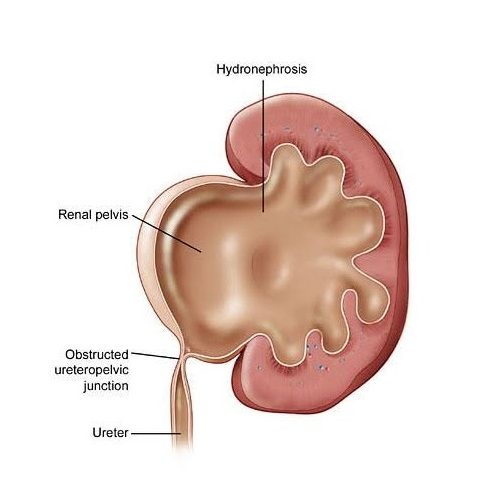Menopause is a natural biological process in women characterized by the permanent cessation of menstrual periods and the decline in reproductive hormones, particularly estrogen and progesterone. It marks the end of a woman’s reproductive years and usually occurs around the age of 50, leading to various physical and hormonal changes. “Urologic problems in menopause” refer...
Psychological and Organic Erectile Dysfunction: Definition, Causes and Differantiation
Erectile dysfunction (ED) is a condition characterized by the inability to achieve or maintain an erection sufficient for sexual activity. It can be broadly categorized into two main types: psychological and organic (physical) erectile dysfunction. Distinguishing between these factors is crucial for appropriate treatment, with psychological ED often addressed through counseling and organic ED requiring...
Hydronephrosis During Pregnancy: Definition, Causes, Symptoms and Treatment
Hydronephrosis (HN) during pregnancy is a medical condition characterized by the swelling or enlargement of one or both kidneys due to the accumulation of urine. This condition occurs when there is an obstruction in the urinary tract, preventing the normal flow of urine from the kidneys to the bladder. Pregnancy-related changes, such as hormonal fluctuations...
Renal Colic During Pregnancy: What is It, Causes, Diagnosis and Treatment
Renal colic (RC) during pregnancy refers to the occurrence of severe, crampy pain in the lower back or side, typically resulting from the presence of kidney stones in pregnant women. Kidney stones are solid deposits that form in the kidneys and can cause significant discomfort when they obstruct the urinary tract. Pregnancy itself can increase...
Ureteropelvic Junction (UPJ) Obstruction: What is It, Symptoms, Diagnosis and Treatment
Ureteropelvic junction (UPJ) obstruction is a condition that affects the urinary system, specifically the point where the ureter connects to the renal pelvis in the kidney. This obstruction occurs when there is a partial or complete blockage at the ureteropelvic junction, impeding the flow of urine from the kidney to the bladder. Symptoms of ureteropelvic...
Recurrent priapism: What is it, Causes, Preventions and Treatment
“Recurrent priapism” refers to a medical condition characterized by persistent and often painful erections that occur repeatedly without sexual stimulation. Priapism is a rare but potentially serious condition that can last for several hours and requires prompt medical attention. This prolonged and involuntary erection is not related to sexual arousal or desire and can affect...
Asymptomatic Bacteriuria in Pregnancy: What is it, Causes, Diagnosis and Treatment
Asymptomatic bacteriuria (AB) in pregnancy refers to the presence of bacteria in the urine of pregnant women without any accompanying symptoms of a urinary tract infection (UTI). This condition is quite common during pregnancy and requires special attention due to its potential to lead to more serious complications if left untreated. Pregnant women are more...
Urinary Tract Infection During Pregnancy: Diagnosis, Sypmtoms, Complications and Treatment
Urinary tract infection (UTI) during pregnancy is a common concern, as it can pose potential risks to both the mother and the developing fetus. This condition occurs when bacteria enter the urinary tract, leading to infection. Understanding the key aspects of UTIs during pregnancy is crucial for timely diagnosis and effective management. Urinary tract infections...
What are Advantages and Disadvantages of Inflatable Penile Prosthesis?
An inflatable penile prosthesis is a medical device used to treat erectile dysfunction (ED) in men. It is a surgically implanted device designed to help men achieve and maintain an erection suitable for sexual activity. The prosthesis consists of three main components: a pair of inflatable cylinders placed within the penis, a fluid reservoir implanted...
Squamous Metaplasia of Urinary Bladder: What is It, Symptoms. Diagnosis, Complications and Treatment
Squamous metaplasia of the urinary bladder (SMB) is a condition characterized by the transformation of the normal bladder lining epithelium into squamous epithelium. The normal lining of the bladder is typically composed of transitional epithelium. However, in response to chronic irritation or inflammation, the transitional cells may undergo metaplasia, transforming into squamous cells. This transformation...











